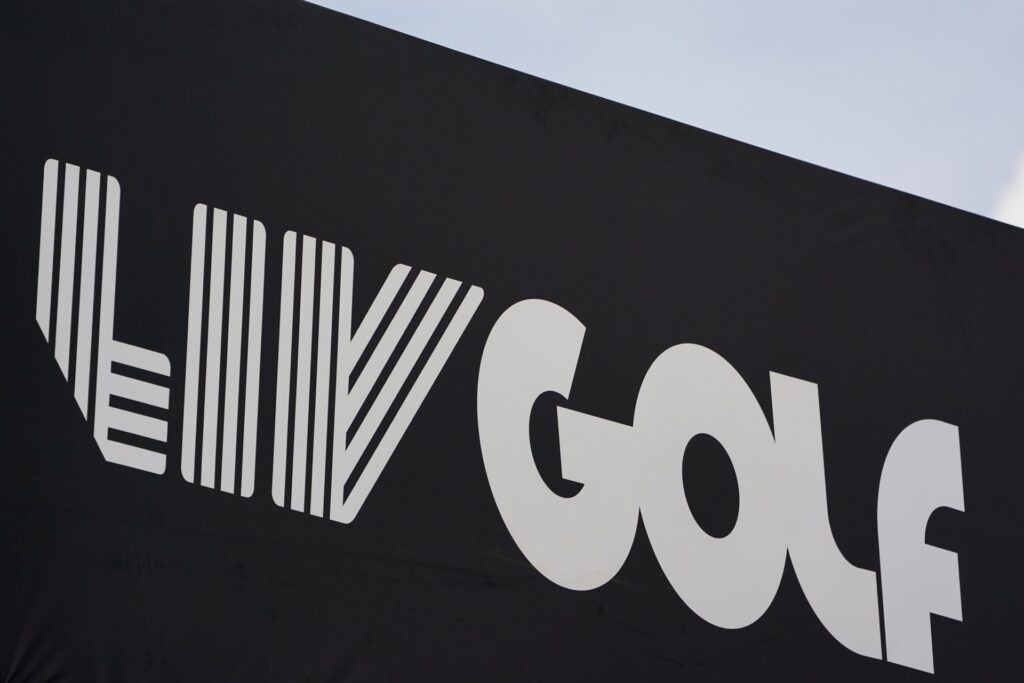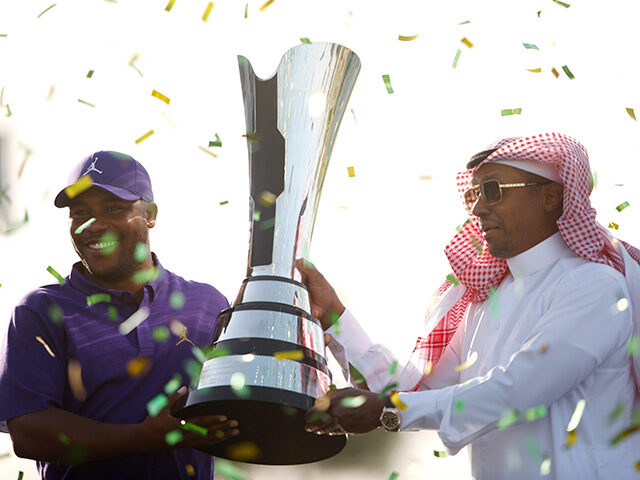The shock announcement on Tuesday that golf’s elite PGA Tour would merge with its Saudi rival LIV Golf prompted a wave of outrage and concern that Saudi Arabia, one of the world’s most prolific human rights abusers, was succeeding in a quest to use sports to polish its public image.
Dubbed “sportswashing,” the practice of attracting positive attention to a government known for criminal and/or immoral activity is certainly not limited to Saudi Arabia; with the 2022 Beijing Winter Olympics, China may be the reigning champion of sportswashing. The sudden reality that golf at the highest levels will now be played under the auspices of the Islamist monarchy, however, is a nearly unprecedented victory for such a regime, greatly advancing Riyadh’s goal of becoming a global cultural power.
It is a goal that Saudi Arabia had already reportedly spent at least $1.5 billion on in 2021, distributed among golf, tennis, horse racing, car racing, and, perhaps most prominently, soccer. It is far from the only such project on the Saudi agenda, which holds “sportswashing” as only one of its series of sports-related goals.
Through its “Vision 2030” government scheme – the brainchild of crown prince and de facto ruler Mohammed bin Salman – Saudi Arabia is seeking to become the premier global destination for professional sports, build a breeding ground for the next generation of historic athletes, and compel its population to adopt athletic lifestyles that build a healthier population and more sustainable healthcare system.
The Vision 2030 agenda is Mohammed bin Salman’s (or MBS, as he is popularly known) plan to evolve Saudi Arabia away from its image as a repressive, oil-dependent fiefdom and towards the status of global superpower, home to a wide variety of industrial endeavors that enrich the population. Advancing Saudi Arabia as a sports power appears pervasively throughout Vision 2030 government propaganda, both in terms of developing a large pool of professional talent and changing the culture of the country itself such as popular pressure exists on citizens to partake in sports.

Signage for LIV Golf is displayed during the pro-am round of the Bedminster Invitational LIV Golf tournament in Bedminster, NJ., Thursday, July 28, 2022. (AP Photo/Seth Wenig)
“The country’s esteemed leadership are truly invested in the impact sport can have in improving the lives of its people and we are fully aligned to support the transformation,” Prince Fahd bin Abdulaziz, speaking then in his capacity as spokesman for a top boxing championship, said in August. “Alongside this we want to showcase the true Saudi Arabia to the rest of the world: The wonderful people, the country’s transformation, the beauty of the landscape on the Red Sea.”
At the time, Saudi Arabia was preparing to welcome heavyweight boxing champion Oleksandr Usyk and challenger Anthony Joshua for a title fight rematch Usyk won.
“The changes and transformation as [a] result of Vision 2030 inspire us to host some of the biggest global sporting events like this,” the prince added.
The written plan of Saudi Vision 2030 specifically mentions “widespread and regular participation in sports” among Saudis and the country itself obtaining top status in the sporting world.
“A healthy and balanced lifestyle is an essential mainstay of a high quality of life. Yet opportunities for the regular practice of sports have often been limited. This will change,” a document explaining the goals of the project noted. “We intend to encourage widespread and regular participation in sports and athletic activities, working in partnership with the private sector to establish additional dedicated facilities and programs.”
“We aspire to excel in sport and be among the leaders in selected sports regionally and globally,” it affirmed.
The Saudi royal family has baked sports into the fabric of its most ambitious Vision 2030 project, the future city of Neom, slated to be built in the nation’s northwest on the ruins of indigenous community grounds. The Saudi government is currently in the process of violently displacing the 20,000 members of the local Howeitat tribe, which has maintained an established presence along the Red Sea banks there for centuries, to make room for the four “neighborhoods” of Neom: the seaside getaway Sindalah, the industrial “innovation” outpost Oxagon, the 106-mile-long skyscraper The Line, and Trojena, its sports and outdoor recreation hub.
Neom is far from being built and reports revealing its planning and execution woes suggest it may never be built. The Line, which Saudi leaders claim will house 5 million people in an inescapable “walkable” building that will “free” people from independent transportation, is the likeliest project to fail. Trojena, however, is far more realistic: a hub for mountain climbing, bicycle riding, yoga, and “high-altitude training,” a potential draw for professional athletes the world over.
In 2020, shortly following the announcement that Saudi Arabia would build Neom, the Saudi Sports Ministry signed a memorandum of understanding committing to turning the future site into “a global sports destination.”
In May, Neom announced an international sports partnership similar to the LIV merger, but with far less fanfare in the United States: a partnership with the Rajasthan Royals, one of the top cricket teams in India. While not significantly popular in the Western Hemisphere, cricket is a top-tier attraction in much of Southeast Asia, as well as in Australia and New Zealand. The partnership, Neom’s leaders noted, would offer recreational cricket training and games for the largely South Asian laborers engaging in the grueling task of building the foundation of the city-to-be. In a nod to Western concerns, the Neom press release claimed, “the cricket program will focus on inclusivity.”
Saudi Arabia’s mission to build a worldwide cricket presence is far behind its efforts in golf or, perhaps even more prominently, car racing. The country hosted Formula 1’s “Saudi Arabia Grand Prix” in Jeddah for the first time in 2021, prompted a wave of anguished concerns from racecar drivers who expressed mild displeasure at being associated with Saudi Arabia’s world-topping execution rate and pervasive repression of women (the drivers ultimately relented and were later banned from making political statements in public without permission). The 2022 Saudi Arabia Grand Prix attracted some negative attention last year after the Yemeni Houthi terrorist organization bombed an oil depot in Jeddah, near the racing course, but is on the fast track to becoming a staple event in the sport.
Riyadh is using a similar playbook with tennis. It hosted its first high-level men’s tennis tournament, the Diriyah Tennis Cup, in 2019, drawing enthusiastic support from its first-time winner, Russian champion Daniil Medvedev.
“I really loved everything here — organization, court, fans, people. Everything was super great and hopefully it’s not going to stop and I’m going to come back next year. I think in three or four years it could be one of the best tournaments on Tour,” Medvedev gushed.
Sports Illustrated noted in April that the Saudi government has connections to the leadership of the Women’s Tennis Association (WTA), which attempted to distance itself temporarily from communist China over the disappearance of Wimbledon doubles champion Peng Shuai but has since relented. It also excerpted remarks from an interview with top men’s player Nick Kyrgios, who appeared to hope that Saudi Arabia expanded its influence in the sport.
Asked about the creation of LIV Golf, Kyrgios said, “if something like that happened [in tennis], I’d be the first to jump on, let me tell you. The guaranteed money for me, my family and, you know, the people around me, that’s why I play.”
“I play to provide for all those people. So really, that would be amazing, you know? I mean, look, I know the ATP’s not gonna be happy with that,” Kyrgios said.
Saudi Arabia sent its first official women’s tennis team to an event hosted by the International Tennis Federation (ITF) in February.
Saudi Arabia’s largest professional sports footprint right now, however, is undeniably in soccer. Soccer is the most popular sport in the country, and FIFA one of the most corrupt organizations on earth, offering ample opportunities for growth. Mohammed bin Salman was a fixture in the audience at the last FIFA World Cup, hosted by neighboring human rights abuser Qatar in November and Saudi Arabia made one of the most exciting headlines of the tournament, defeating eventual champion Argentina. Saudi Arabia itself will host the FIFA Club World Cup this December.
The country has also made itself home to arguably the top soccer player in the world: Cristiano Ronaldo, who signed with the country’s Al Nassr club last year. To court Ronaldo, Saudi officials appear to have silently foregone imposing its authoritarian sharia Islamic legal system on the player, allowing him to live with his girlfriend unmarried – a crime for Saudi citizens. In exchange, Ronaldo has become a spokesman for Saudi soccer, encouraging other top athletes to consider moving to the country.
Ronald also appeared in a promotional video with his soccer club to celebrate Saudi Founding Day in February, dressed in traditional clothes and brandishing a sword.
At least one top soccer player, Karim Benzema, heeded Ronaldo’s call. News that French star Benzema signed with Saudi club Al Ittihad broke on Monday, soon to be obscured by the PGA-LIV merger.
“Al Ittihad is a new challenge for me. It’s a good league and there are many good players,” Benzema told reporters. “Cristiano Ronaldo is already here, he is a friend who shows that Saudi Arabia is starting to get ahead and I am here to win as I did in Europe.”
Reports also circulated that Saudi team Al Hilal attempted to court Lionel Messi, the reigning World Cup champion and arguably best player in the world, but as of Wednesday afternoon, Messi appears to have accepted an offer from Miami.

COMMENTS
Please let us know if you're having issues with commenting.